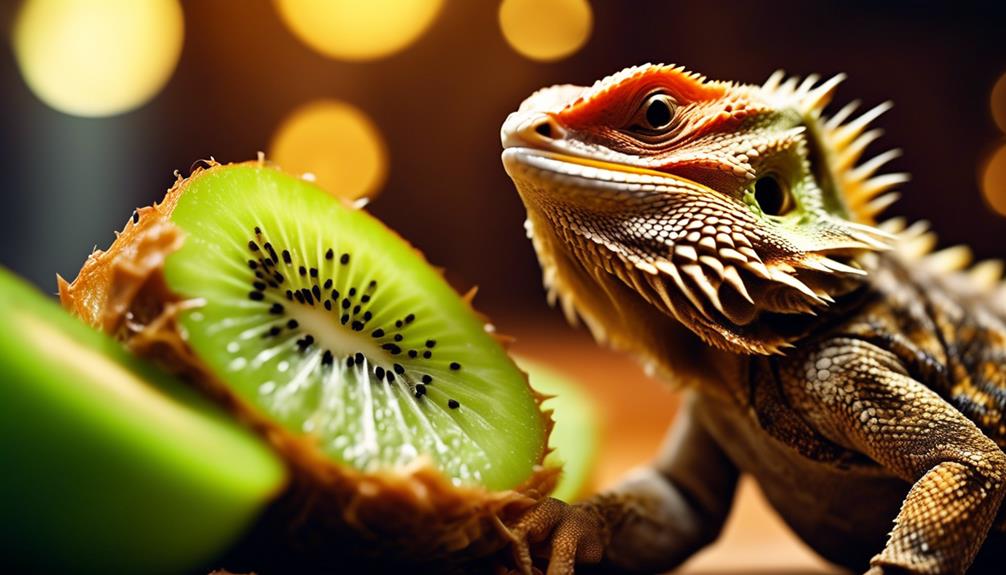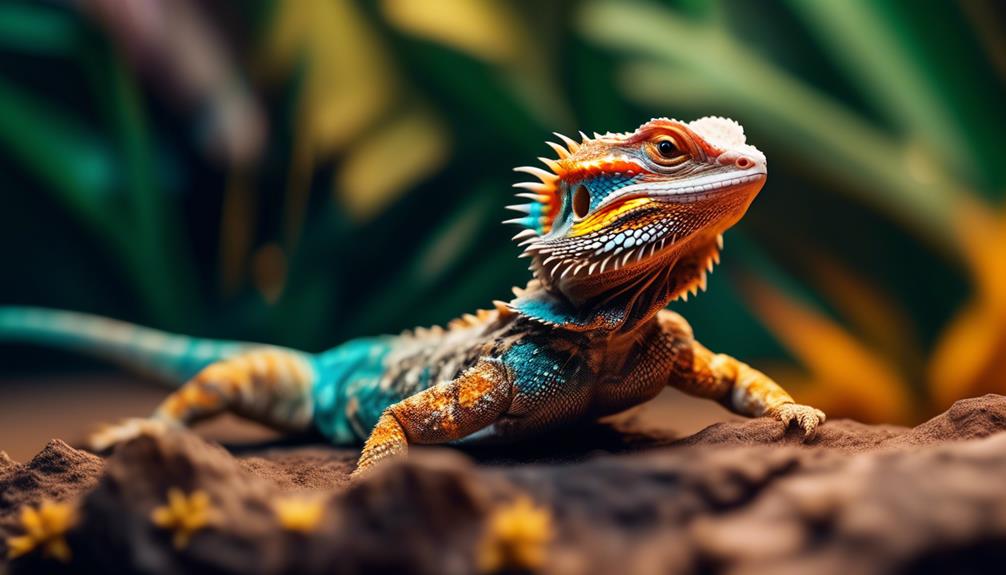Did you know that bearded dragons, despite their carnivorous nature, can benefit from consuming fruits? That's right, introducing kiwi into your bearded dragon's diet can provide them with a range of essential nutrients.
But what exactly are these benefits, and how can you ensure you're feeding kiwi to your scaly friend in the right way? In this article, we will explore the advantages of incorporating kiwi into a bearded dragon's diet, discuss the safety and guidelines for feeding kiwi, and provide insights into their feeding schedule.
So, let's embark on this journey together and uncover the benefits of feeding kiwi to bearded dragons.
Key Takeaways
- Kiwi is a safe and healthy treat for bearded dragons when fed in moderation.
- Feeding kiwi to bearded dragons can help prevent vitamin deficiencies and boost their immune system.
- It is important to wash and remove the skin and seeds of kiwi before feeding it to bearded dragons.
- Offering kiwi in small, bite-sized pieces and using tongs or a dish can minimize the risk of injury during feeding.
Bearded Dragon Diet and Nutrition
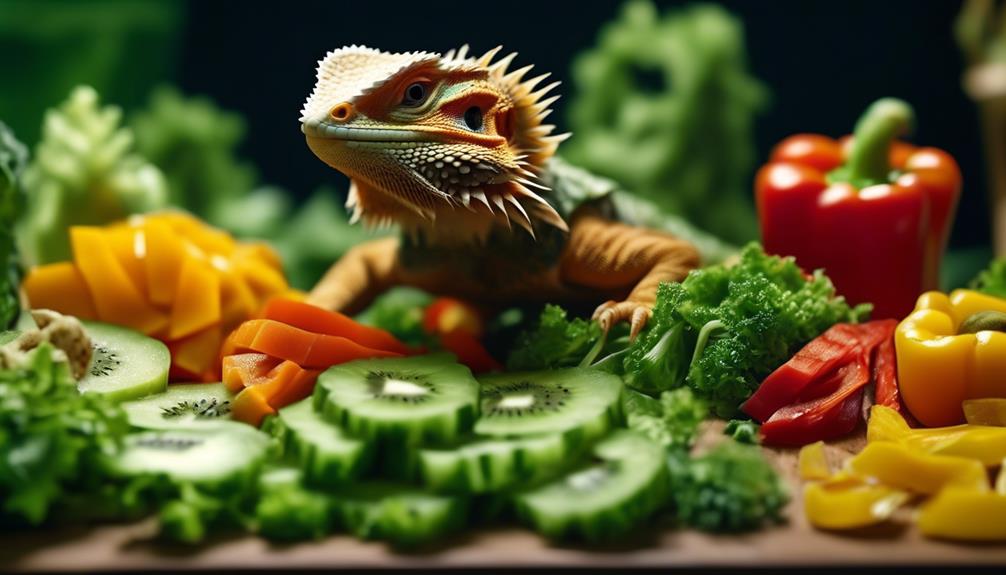
When it comes to the diet and nutrition of bearded dragons, it's important to provide them with a balanced and varied selection of fruits and vegetables. A proper nutrition plan is crucial for their overall health and well-being. Bearded dragons require a diet that's rich in vitamins, minerals, and fiber.
This includes a variety of leafy greens such as collard greens, dandelion greens, and mustard greens. Additionally, they should be given a mix of vegetables such as bell peppers, carrots, and squash. Fruits can also be included in their diet, but should be given in moderation due to their high sugar content.
It's important to ensure that the bearded dragon diet is diverse and provides all the necessary nutrients for their growth and development.
Feeding Kiwi: Safety and Guidelines
Feeding kiwi to bearded dragons is a safe and nutritious addition to their diet. When offering kiwi to your bearded dragon, it's important to follow these guidelines to ensure their safety and well-being:
- Moderation: Kiwi should be fed to bearded dragons in moderation. While it provides essential vitamins and minerals, excessive consumption can lead to digestive issues.
- Preparation: Before feeding kiwi, make sure to wash it thoroughly. Remove the skin and seeds, as they can be difficult for bearded dragons to digest. Cut the kiwi into small, bite-sized pieces to make it easier for them to eat.
- Ripe but not overly ripe: Choose kiwis that are ripe but not overly ripe. Overly ripe kiwis can be too soft and may cause choking hazards for bearded dragons.
- Feeding method: Offer the kiwi to your bearded dragon using tongs or a dish. This ensures that they can easily access and consume the kiwi while minimizing the risk of accidental injury.
Importance of a Balanced Bearded Dragon Diet
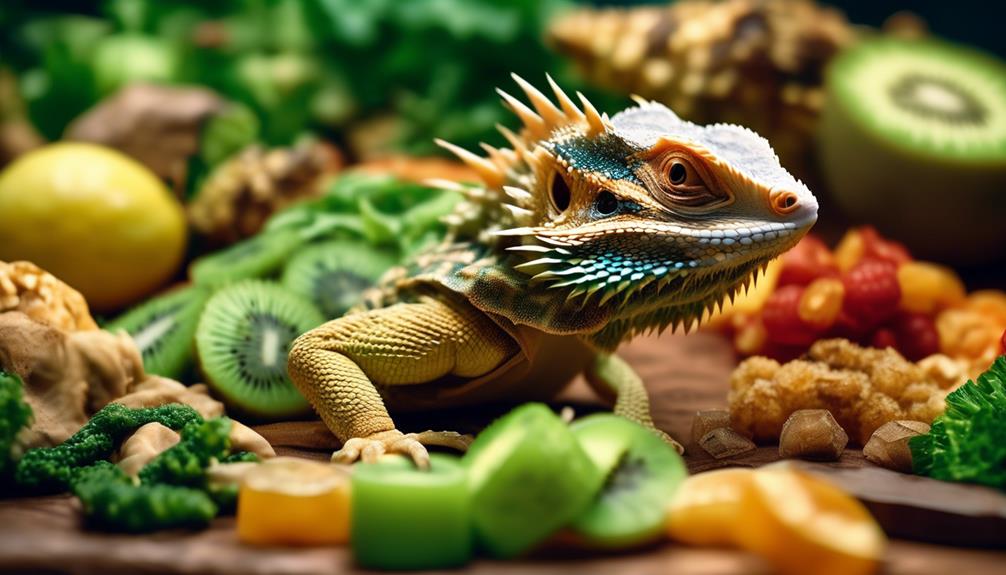
A well-balanced diet is crucial for the overall health and well-being of bearded dragons. Providing a variety of foods ensures that they receive the necessary nutrients for growth and development. An unbalanced diet can lead to various health issues and deficiencies in essential vitamins and minerals. To understand the importance of a balanced bearded dragon diet, let's explore the potential risks of an unbalanced diet in the table below:
| Potential Risks of an Unbalanced Diet |
|---|
| Malnutrition |
| Metabolic bone disease |
| Organ damage |
An unbalanced diet lacking variety can result in malnutrition, where the dragon does not receive adequate nutrients. This can lead to stunted growth, weakened immune system, and decreased overall health. Additionally, a lack of essential nutrients, such as calcium and vitamin D3, can cause metabolic bone disease, resulting in weakened bones and deformities. Moreover, an unbalanced diet can lead to organ damage due to deficiencies in vital nutrients. Therefore, it is essential to provide a diverse and balanced diet to ensure the optimal health and well-being of bearded dragons.
Bearded Dragon Feeding Schedule and Frequency
We recommend establishing a consistent feeding schedule for bearded dragons to ensure their nutritional needs are met. Here are some important considerations for bearded dragon meal planning and feeding habits:
- Frequency: Bearded dragons should be fed once or twice a day, depending on their age and size. Younger dragons require more frequent feedings to support their growth and development.
- Timing: It's essential to feed your bearded dragon at the same time every day. This helps them establish a routine and ensures they receive their meals regularly.
- Portion Control: Be mindful of the amount you feed your bearded dragon. Overfeeding can lead to obesity and various health issues. Monitoring their weight is crucial to maintaining their overall health.
- Balanced Diet: While it's important to establish a feeding schedule, it's equally essential to provide a balanced diet. Include a variety of fruits, vegetables, and insects in their meals to ensure they receive all the necessary nutrients.
Health Benefits of Kiwi for Bearded Dragons
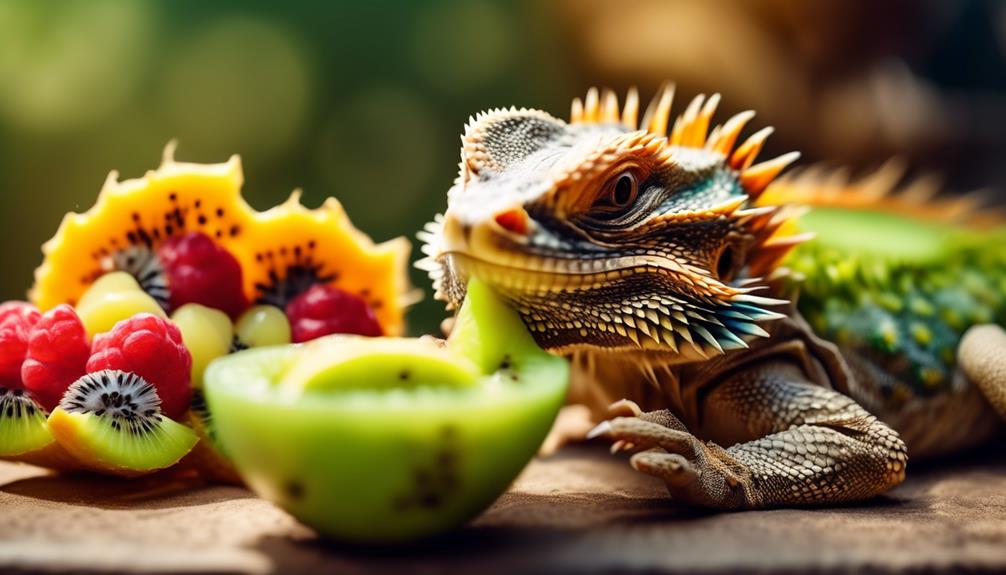
Kiwi offers several health benefits for bearded dragons, making it a nutritious addition to their diet. It serves as a source of hydration for these reptiles, helping to keep them properly hydrated. Additionally, kiwi is rich in essential vitamins and minerals, which play a crucial role in preventing vitamin deficiencies in bearded dragons. The high vitamin C content in kiwi boosts their immune system, promoting overall health and well-being. Furthermore, the dietary fiber found in kiwi aids in digestion, ensuring the proper functioning of their digestive system. Bearded dragons enjoy the taste of kiwi, making it a healthy treat that they will eagerly consume. However, it's important to feed kiwi in moderation as part of a balanced diet for these reptiles.
| Health Benefits of Kiwi for Bearded Dragons |
|---|
| – Source of hydration |
| – Prevents vitamin deficiencies |
| – Boosts immune system |
Frequently Asked Questions
Can Bearded Dragons Eat the Skin and Seeds of Kiwi?
No, bearded dragons should not eat the skin and seeds of kiwi. They can enjoy the benefits of feeding on the flesh of the fruit, which provides nutritional value and is safe for their consumption.
How Often Should Bearded Dragons Be Fed Fruits Like Kiwi?
Bearded dragons should be fed fruits like kiwi once or twice a day. Feeding frequency depends on the age of the dragon. Kiwi is safe and offers nutritional value, including vitamin C and dietary fiber.
Are There Any Potential Risks or Side Effects of Feeding Kiwi to Bearded Dragons?
There are no potential risks or side effects of feeding kiwi to bearded dragons. Kiwi provides nutritional value, including essential vitamins and minerals. It is a safe and healthy treat when given in moderation.
Can Bearded Dragons Eat Other Types of Fruits in Addition to Kiwi?
Bearded dragons can eat a variety of fruits in addition to kiwi. Kiwi provides nutritional benefits such as vitamin C and dietary fiber. To introduce kiwi into a bearded dragon's diet, wash it thoroughly, remove the skin and seeds, and offer small, ripe pieces.
Is There a Specific Time of Day That Is Best for Feeding Bearded Dragons Kiwi?
The best time for feeding kiwi to bearded dragons depends on their feeding schedule. Kiwi has great nutritional value for bearded dragons, providing vitamins and fiber. It's important to offer kiwi in moderation as part of a balanced diet.
Conclusion
In conclusion, incorporating kiwi into your bearded dragon's diet can provide numerous benefits for their overall health. Just like a well-balanced meal nourishes our bodies, feeding kiwi to bearded dragons can support their digestive health and boost their immune system.
However, it's important to feed kiwi in moderation and adhere to a regular feeding schedule to prevent any health issues. Remember, a healthy diet is like a symphony for your bearded dragon, with kiwi playing a vital role in creating a harmonious and thriving reptile.
